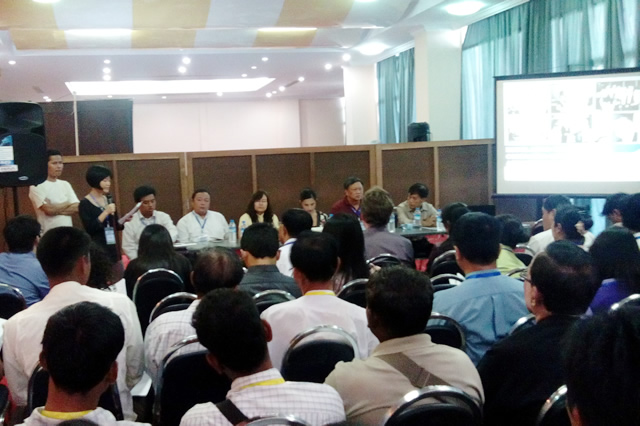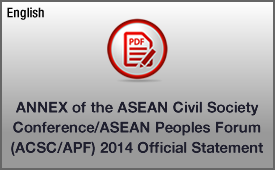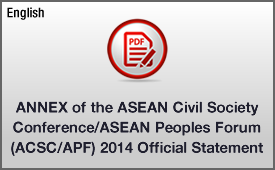MCRB at the Asean People Forum 2014

On 22 March 2014, the Myanmar Centre for Responsible Business hosted a workshop entitled “Promoting Inclusive and Responsible Business: Experiences of Myanmar, Singapore and Across ASEAN” at the ASEAN People’s Forum on Business and Human Rights.
On 22 March 2014, the Myanmar Centre for Responsible Business hosted a workshop entitled “Promoting Inclusive and Responsible Business: Experiences of Myanmar, Singapore and Across ASEAN” at the ASEAN People’s Forum on Business and Human Rights at Myanmar Convention Centre in Yangon. An expert panel included representatives of MCRB, Myanmar civil society organisations including Badeidha Moe, Paung Ku, and Karen River Watch as well as Maruah Singapore, and the ASEAN Human Rights Resource Center.
Their presentations and discussion covered the following key points:
-
Trends across the ASEAN region for NGOs (by a combination of international NGOs and local grassroots organizations) to lobby multinational companies at their HQs to encourage them to take a zero tolerance approach to land-grabbing and depriving communities of their livelihoods when they source products from Southeast Asia
-
Case studies of foreign companies, especially Asian companies, operating in Myanmar regions such as Dawei and their impact on issues relating to corruption, land (including land grabbing and unfair and inconsistent compensation for land acquisition), livelihoods and environment. Insufficient multi-stakeholder participation and involvement were noted.
-
In conflict areas in Myanmar, companies were forced to engage with both state governments and armed groups. The lack of ceasefire agreements prevents companies from responsible investment in those regions; both governments and non-state actors are responsible for negative impact of businesses in these areas.
-
The Myanmar Centre for Responsible Business (MCRB) is encouraging local companies to pursue anti-corruption practices, organisational transparency and human rights with a project called Transparency in Myanmar Enterprises (TiME). While this focused on website transparency, concerted effort from all stakeholders was also needed to monitor and change companies’ actual performance.
-
Singapore has been successful in eradicating corruption through strong enforcement and severe penalties. Singapore companies practice inconsistent labour and environmental practices in the region.
Over 100 participants including representatives from local and regional organizations and individuals took part in the workshop which adopted recommendations to government as follows:
-
In line with the state duty to protect, as outlined in the 2011 UN Guiding Principles on Business and Human Rights and ratified international conventions, ASEAN Member States should take steps to prevent, investigate, punish and redress business-related human rights abuses through effective policies, legislation, regulations and adjudication, and promote international standards and best practices through a common framework.
-
ASEAN Member States should develop and transparently implement regulatory frameworks on land and land tenancy, which are consistent with The Voluntary Guidelines on the Responsible Governance of Tenure of Land, Fisheries and Forests in the Context of National Food Security to address the negative impacts of large-scale land acquisition for agricultural and extractive industries across the region. Development of such frameworks should be in close consultation with business enterprises and civil society specifically taking into account long-term impact on the communities concerned.
-
In line with ASEAN Member States’ obligations under the Convention against Corruption, Member States should redouble efforts to combat corruption at the national and ASEAN level, and engage both business and civil society in these efforts. This should include greater transparency of business contracts in land and extractives, providing a supportive environment of the media to pursue their essential role in exposing corruption, and prosecution of those involved in corrupt practices.
These were included in:
The statement of the ACSC/APF itself consolidated all the recommendations from 35 workshops held on that day on key four topics such as peace, fairness, development of Human Rights and democratic transition. The consolidated statement was transmitted to the ASEAN governments that will meet civil society representatives on 11 May to discuss about implementation of civil societies’ recommendations.
အထက်ပါအကြောင်းအရာနှင့်ပတ်သတ်၍ ဆက်လက်ဖတ်ရှုလိုပါက
- အမျိုးသားမြေဥပဒေရေးဆွဲရေးလုပ်ငန်းစီမံချက် ဆိုင်ရာ စီးပွားရေးလုပ်ငန်းများနှင့် အွန်လိုင်းဆွေးနွေးပွဲ
- MCRB Expresses Concern About the Impact on Responsible Investment of the Amendments to the Virgin, Vacant and Fallow Lands Law
- MCRB submits comments to Parliament on the draft Land Acquisition Act
- Voluntary Guidelines on the Responsible Governance of Tenure (VGGT) of Land, Fisheries and Forests
- Consultation to update MCRB’s Land Rights and Business in Myanmar Briefing Paper
 English
English မြန်မာ
မြန်မာ မြန်မာ (unicode)
မြန်မာ (unicode)










